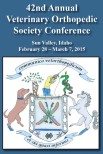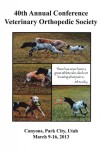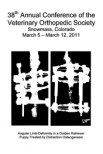AIM: To test whether intra-articular injection of porcine adipose-derived stem cells (ADSCs) can treat canine osteoarthritis (OA).
METHODS: To enroll in this study dogs must have stifle joint OA that had lasted ≥ 3 mo and been treated with OA medication without significant improvement. Three dogs fulfilled these criteria and were thus subjects for ADSCs treatment. ADSCs were isolated from abdominal adipose tissue of a 2-mo-old female Yorkshire pig. Their stem cell marker expression was examined by immunofluorescence staining. For treatment, 5 million ADSCs were injected into the diseased joint of each dog. In the next 48 h, the patient was observed for signs of inflammatory and allergic reactions. The patient was then discharged to the owner and, at 2, 6, and 12 wk, followed up with orthopedic assessment, owner questionnaire, X-ray imaging, and force-plate gait analysis.
RESULTS: Porcine ADSCs expressed mesenchymal stem cell markers CD90 and CD105. Injection of porcine ADSCs into canine stifle joints did not cause any inflammatory or allergic reactions. Orthopedic evaluation found improvements in two dogs, particularly at the longest time point. Owners' evaluation found increased capacity and decreased pain in all three dogs' activities such as walking and running. Radiographic evaluation did not find statistically significant differences before and after treatment. Force-plate analysis found significant improvements in all three dogs after treatment.
CONCLUSION: Xenotransplantation of ADSCs for the treatment of OA is feasible. Further studies are needed to validate this novel treatment modality, which can then be implemented for the routine treatment of OA in veterinary medicine.
Intra-articular transplantation of porcine adipose-derived stem cells for the treatment of canine osteoarthritis: A pilot study
Journal
Tsai SY, Huang YC, Chueh LL, Yeh LS, Lin CS. World J Transplant. 2014 Sep 24; 4 (3): 196-205.









